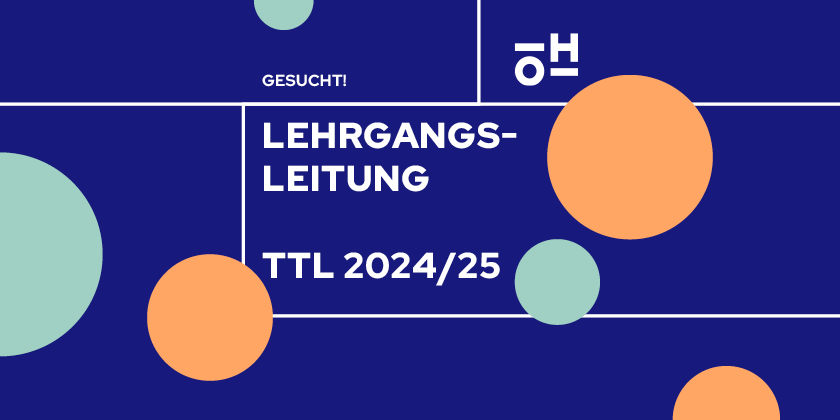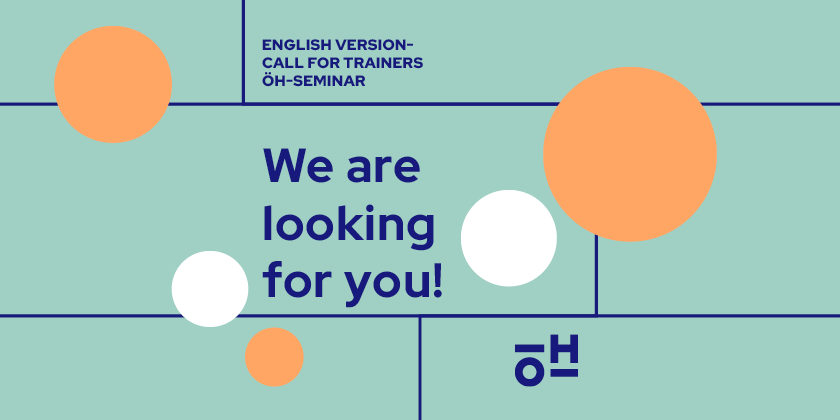Background and aims of the tutorials
Political claim
As the Austrian National Union of Students (ÖH), we do not see the university as an institution that is detached from society, but one that is closely connected to it. In the same way, students are part of society, have an impact on it and are shaped by social conditions. Our policy is therefore not limited to the university, but must have a claim for society as a whole. We are committed to combating fascist, sexist, anti-Semitic and racist behavior.
ideas and against any form of discrimination against disadvantaged groups. In this political self-image, the tutorials offer students a framework for critical examination of society, the university and their own studies, and thus the opportunity to develop emancipatory socio-political thinking and action.
First semester tutorials
First semester tutorials are beginners’ tutorials within the meaning of § 60 para. 1c UG 2002. They offer students support in coping with the performance, organizational and social demands of the first year of study.
Starting university is often associated with major personal upheavals: a new place to live, a new environment and a new course of study. The first semester tutorials offer first-year students a space in which they can ask questions and receive information about studying from students in higher semesters, exchange experiences during their studies and support each other, and help them to build a social environment during their studies.
Historically and also in their current primary function, the first semester tutorials have an egalitarian claim. While first-year students from families with academics have someone who can help them with questions about their studies, students from families without academics are on their own. The first semester tutorials are intended to at least partially compensate for this lack of environment through contact with students from older semesters and networking with other first-year students.
The first semester tutorials are organized and held by students from older semesters. The so-called tutors travel to a training seminar for their training, which is led by trainers.
Training seminar
At the training seminar, which takes place over several days at a seminar location, the future tutors are taught the necessary skills and tools by the trainers to be able to hold tutorials themselves. Participants learn the basics of group dynamics and group leadership and develop various methods and design options for their first semester tutorial. This and all the beginnings of concrete planning of the tutorials take into account the different needs and life realities of first-year students. In addition, the
future tutors basic knowledge about the background and aims of the first semester tutorials, as well as knowledge about contact points and basic knowledge about the ÖH.
During the training seminar, tutors should develop an awareness of the diversity of backgrounds and needs of first-year students, as well as of their role and responsibility as tutors. This includes an understanding of the multitude of different social identities, for example gender, sexuality or migration backgrounds, and questioning one’s own attitudes and possible prejudices.
Thematic tutorials
Thematic tutorials allow students from different degree programs to explore various topics in greater depth and to network.
Thematic tutorials provide participants with additional skills and enable them to lead future tutorials with more sensitivity to a specific topic or to offer topic-specific tutorials. Since we as the ÖH see ourselves as an institution that is closely connected to society and society also has an impact on universities, themed tutorials are held on social issues and discourses in particular. The themed tutorials are also led by trainers.
Function of the trainers
The trainers have the task of designing and guiding the first-semester tutorial training seminars and providing the participants with the skills they need to hold tutorials for first-semester students.
Trainers have a high level of social competence and a willingness to (self-)reflect. They are aware of their role and the associated responsibility and design their seminars to meet the needs of participants. Trainers have a keen awareness of and ability to reflect on social conditions and forms of discrimination, act accordingly with respect and can also sensitize future tutors to the diverse backgrounds of first-semester students.
The trainers have theoretical knowledge of communication and group dynamics and can not only apply this in practice but also pass it on at training seminars. They also have knowledge of the first semester tutorial and basic knowledge of the organization of the ÖH and important contact points for students. The trainers see the objectives of the tutorials as guiding principles for their work.
The tutorial trainer course (TTL)
Aims of the course
The course is designed to enable participants to become trainers and train future tutors as part of the training seminars, as stipulated in the agreement between the Federal Ministry of Science and Research (BMBWF) and the Austrian National Union of Students (ÖH).
As part of the tutorial trainer course, the participants should develop or acquire the skills and competencies mentioned in the section on the function of trainers and be trained as trainers. The aim of the TTL is for participants to later work as trainers in first semester tutorials and themed tutorials.
Requirements for the course concept
The course should start in December 2024 at the earliest and be completed by March 2026 at the latest. The course must comprise at least 180 hours (60 minutes each). The focus of the course will be on training seminars for first semester tutors. To ensure that participants also gain practical experience, they must complete a co-training course (together with a person who has already been trained as a trainer) as part of a training seminar. The participants should be taught a difference-conscious and anti-discriminatory way of working. The course will also cover the principles and objectives of tutorials as well as the basics of employment law for trainers.
Most of the individual modules should be held by trainers who are not part of the course management team. The criteria for the selection of trainers must be presented transparently. At least 50 percent of the trainers must be FLINTAemployees. When selecting trainers, preference should be given to trainers from the tutorial context due to their in-depth understanding. If a trainer is selected who is not active in the tutorial context, a reason for the choice of trainer must be given.
Requirements for the selection procedure
There will be a selection process to determine the most suitable applicants for the course. This selection procedure is advertised separately. To ensure that the selection procedure can be tailored to the course, criteria must be developed in the concept to be submitted to determine the suitability of both the overall group and the individual applicants for the course. The financing plan must include a budget for the selection procedure.
Requirements for the course leader
We are looking for at least two course instructors. At least one of the applicants must have completed a trainer training of 180 hours (60 minutes each). The course concept must include all forms of tutorials, i.e. training seminars for first semester tutorials and topic tutorials. At least 50% of the course instructors must be FLINTA staff. FLINTA* employees with the same qualifications are given preference.
Tasks of the course management
The course management is responsible for the organization and content of the course. This includes the definition of the modules, their content and the selection of trainers for the modules, as well as all framework conditions (scheduling, accommodation, catering, etc.). The final content of the course is to be decided in consultation with the ÖH Tutorial Committee.
The course director submits a report on the selection of participants to the committee. This should contain the selection criteria and the number and names of the accepted and rejected applicants.
The course leader is also available as a continuous contact person for the participants. She regularly provides the committee with information on the current status of the course. For this purpose, a meeting should be held with at least one person from the ÖH chair team, one person from the economics department, the chair and deputy chair after the course director has been selected. Chair of the committee to discuss collaboration and communication with the project over the time of the course.
In consultation with the committee, the course management organizes three information days for applicants before the start of the course. These information days serve to provide applicants with basic information on organizational and content-related aspects of the course. The dates and locations of the information days must be agreed with the Tutorial Committee.
For participants with care responsibilities, there must be the possibility of care (e.g. childcare) during the course. The course management is to provide financial and organizational support in cooperation with the business department.
Requirements for the financing plan
The employment of the course director is based on a freelance contract or – if desired – on a work contract with the ÖH Federal Representation. The amount of remuneration for the course leaders should be between €4,500 and €20,500 gross, depending on the extent of the course leaders’ own contributions. However, it is up to the applicants themselves to decide what level of remuneration they list in their financial plan for their work as course leaders.
The total gross budget of the TTL – including the remuneration for the course management – amounts to €120,000.
The deductible per participant should be kept as low as possible. The maximum amount to be charged is €450. If participants are unable to pay the deductible for economic reasons, participation should still be made possible. A funding pot of approx. 20 percent of the deductible is set aside for this purpose. If this funding pot is not fully utilized, the surplus will be deducted aliquot from the individual participant’s deductible. The deductible and the funding pot must be taken into account in the financing plan.
Concept Submission:
In addition to the CVs of all applicants for the course management and a letter of motivation, the application must include an elaborated concept with the following elements:
- Proof of trainer training amounting to 180 hours (60 minutes each) from at least one course instructor
- Description of the trainers of the individual modules and contextualization for the selection of these persons
- Financing plan taking into account
– the information days
– the budget for the selection procedure
– Deductible and funding pot - Aims and procedure of the training for 20-25 participants
- Didactic concept of the course
- Description of the selection procedure criteria
Useful hints:
- Link to the guidelines for tutorials: https://etut.oeh.ac.at/richtlinie/
- It is possible to rent rooms at the universities free of charge via the ÖH-BV as well as all university representations.
- There is an agreement between the BV and the JUFAs to stay there at a reduced rate.
- Applications must be received by May 19, 2024 as a PDF by email at sekretariat@oeh.ac.at and etut@oeh.ac.at.




